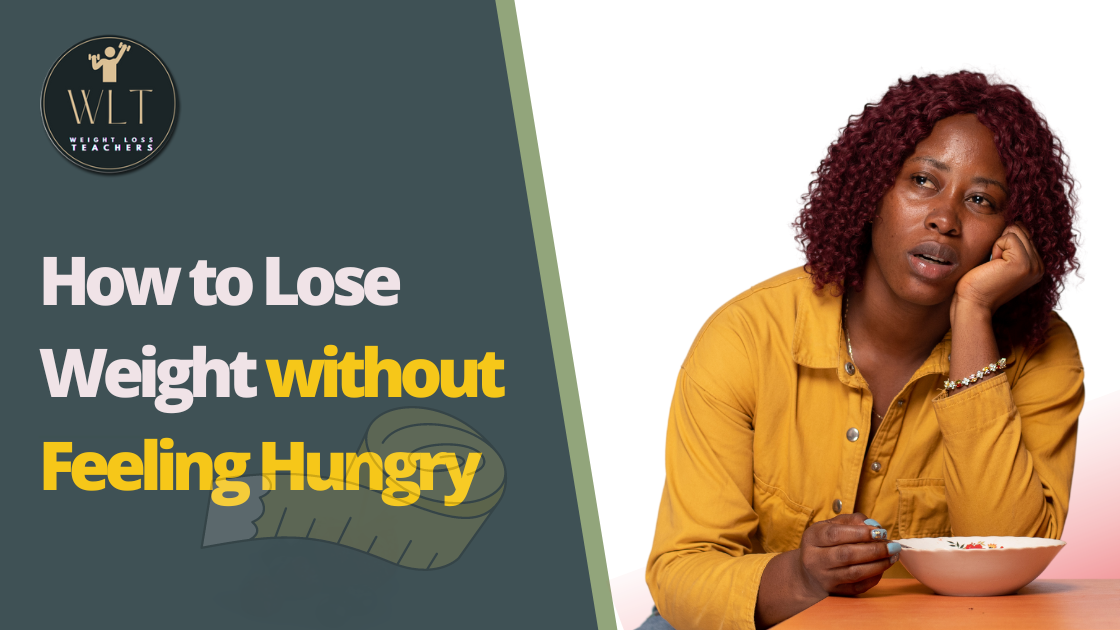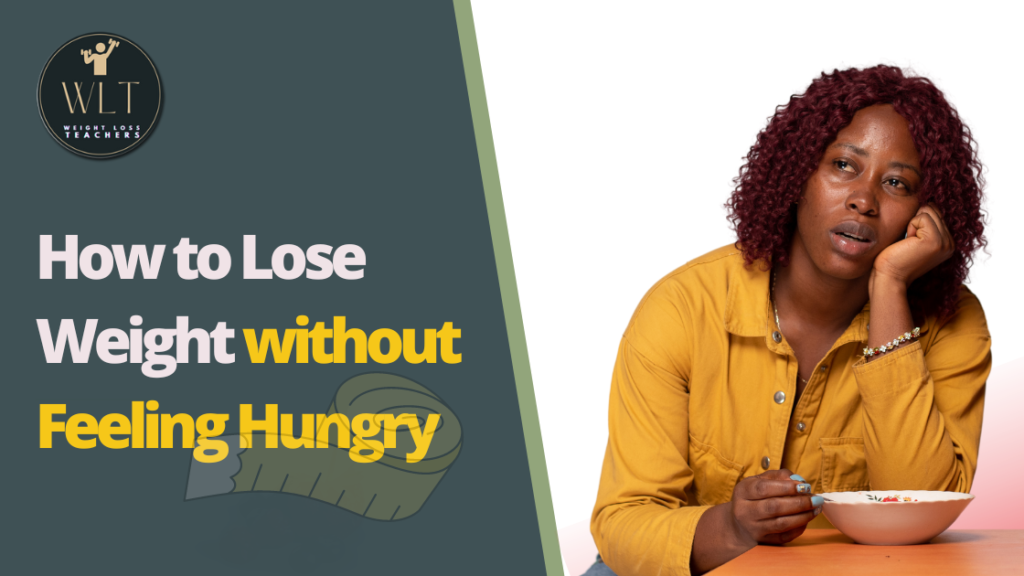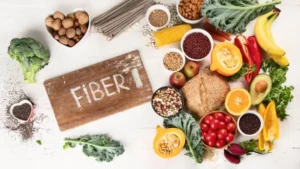
How to Lose Weight without Feeling Hungry

Losing weight is a common goal for many people, but it can be challenging to achieve if you’re constantly feeling hungry. Hunger is a natural physiological response to a lack of food, but it can derail your weight loss efforts if it leads to overeating or binge eating. Fortunately, there are several strategies you can use to lose weight without feeling hungry.
Table of Contents
Introduction
In this article, we’ll explore some of the most effective ways to achieve sustainable weight loss while still feeling satisfied and nourished

How to Lose Weight without Feeling Hungry
Eat More Fiber

When it comes to losing weight without feeling hungry, incorporating more fiber into your diet is a key strategy. Fiber is an indigestible carbohydrate found in plant-based foods that offers numerous health benefits, including promoting satiety and aiding in weight management.
Fiber-rich foods add bulk to your meals, which helps you feel fuller for longer periods. They also have a slower digestion rate, resulting in a more gradual release of nutrients and energy into your bloodstream. This slower digestion can help regulate blood sugar levels, preventing spikes and crashes that can trigger hunger and cravings.
To increase your fiber intake, focus on incorporating fruits, vegetables, whole grains, legumes, and nuts and seeds into your meals and snacks. These foods are not only packed with fiber but also provide essential vitamins, minerals, and antioxidants. For example, you can enjoy a bowl of oatmeal topped with fresh berries and a sprinkle of chia seeds for breakfast, have a colorful salad with mixed vegetables and beans for lunch, and snack on a handful of almonds or a piece of fruit in between meals.
Aim to consume around 25-30 grams of fiber per day, gradually increasing your intake to allow your body to adjust. Remember to drink plenty of water as you increase your fiber consumption to aid in digestion and prevent constipation.
It’s important to note that fiber works best when consumed alongside an adequate amount of water. The combination of fiber and water adds bulk to your diet and creates a feeling of fullness, reducing the likelihood of overeating. Be sure to stay hydrated throughout the day by drinking water and consuming water-rich foods like fruits and vegetables.
In addition to supporting weight loss, high-fiber diet offers numerous health benefits, such as improved digestion, lowered cholesterol levels, and reduced risk of chronic diseases like heart disease, diabetes, and certain types of cancer.
Therefore, increasing your fiber intake through a variety of plant-based foods can promote feelings of fullness, support weight loss, and contribute to overall well-being. Remember to gradually increase your fiber intake, stay hydrated, and enjoy a diverse range of fiber-rich foods for optimal results in your weight loss journey without experiencing excessive hunger.
Choose Protein-Rich Foods

Including protein-rich foods in your diet is an effective strategy for losing weight without feeling hungry. A protein play a crucial role in weight management as it helps regulate appetite, promotes satiety, and supports the maintenance of lean muscle mass.
When you consume protein, it triggers the release of hormones that signal feelings of fullness and satisfaction. Additionally, protein has a higher thermic effect, meaning it requires more energy to digest compared to carbohydrates or fats. This increased energy expenditure can further support weight loss efforts.
To incorporate more protein into your meals, opt for lean sources such as poultry, fish, eggs, dairy products, legumes, and tofu. These foods are not only rich in protein but also provide other essential nutrients. For example, you can enjoy grilled chicken breast with steamed vegetables for dinner, have a Greek yogurt with mixed berries as a snack, or include lentils in a hearty vegetable soup.
Aim to include a source of protein at every meal to promote satiety and control hunger. By doing so, you provide your body with the building blocks it needs for muscle repair, maintenance, and growth. This is particularly important during weight loss, as it helps preserve lean muscle mass and prevents a decrease in metabolic rate.
It’s worth noting that protein intake should be balanced with other macronutrients and overall calorie intake. While protein is important, consuming excessive amounts can lead to an imbalance in your diet. Consult with a healthcare professional or registered dietitian to determine the appropriate protein intake for your specific needs and weight loss goals.
In addition to supporting weight loss, consuming adequate protein has other benefits, including improved muscle tone, enhanced post-exercise recovery, and better overall body composition.
Remember that variety is key when it comes to protein sources. Explore different options to keep your meals interesting and ensure you receive a range of essential amino acids. Consider trying plant-based protein sources like quinoa, chia seeds, hemp seeds, or seitan if you follow a vegetarian or vegan lifestyle.
By prioritizing protein-rich foods in your diet, you can effectively manage hunger, support muscle health, and optimize your weight loss efforts. Be sure to include a variety of lean protein sources in your meals while maintaining a well-balanced diet overall.
Drink Plenty of Water

Staying properly hydrated is a simple yet powerful strategy for losing weight without feeling hungry. Water is not only essential for overall health but can also help control appetite, promote satiety, and support your weight loss goals.
Sometimes, feelings of hunger can be mistaken for thirst. By staying adequately hydrated, you can prevent unnecessary snacking and curb those false hunger signals. Additionally, drinking water before a meal can help you feel fuller and potentially reduce your calorie intake during the meal.
Aim to drink at least eight glasses of water per day, and adjust your intake based on factors such as activity level, climate, and individual needs. You may need more water if you engage in intense physical activity or during hot weather to compensate for increased fluid loss through sweating.
If you find plain water boring, you can enhance its flavor by infusing it with natural ingredients such as slices of lemon, cucumber, or mint leaves. Herbal teas, both hot and iced, can also contribute to your daily fluid intake and provide a variety of flavors without adding calories.
It’s important to note that certain beverages, such as sugary sodas, fruit juices, and sweetened coffee or tea, can contribute to excessive calorie intake without providing the same level of satiety as whole foods. It’s best to limit or avoid these calorie-containing drinks and opt for water or other low-calorie alternatives instead.
In addition to promoting satiety, water offers numerous other benefits for weight loss. It aids in digestion, helps maintain optimal metabolic function, and supports the elimination of waste products from the body.
To ensure you’re staying adequately hydrated, pay attention to your body’s thirst signals and drink when you feel thirsty. Carry a reusable water bottle with you throughout the day as a reminder to hydrate regularly.
Remember that hydration is not only important for weight loss but also for overall health and well-being. By making water your beverage of choice and staying properly hydrated, you can support your weight loss journey, prevent unnecessary snacking, and promote optimal bodily functions.
Eat More Whole Foods

When aiming to lose weight without feeling hungry, emphasizing whole foods in your diet can be highly beneficial. Whole foods are minimally processed and retain their natural nutrients, fiber, and satiating properties. By including more whole foods in your meals, you can promote weight loss while feeling satisfied and nourished.
Whole foods, such as fruits, vegetables, whole grains, legumes, and nuts and seeds, are rich in essential vitamins, minerals, antioxidants, and dietary fiber. The combination of these nutrients helps regulate hunger hormones, slow down digestion, and provide a feeling of fullness.
Incorporating a variety of colorful fruits and vegetables into your meals not only adds flavor and texture but also boosts nutritional value. These fiber-rich foods add bulk to your meals, promoting satiety while providing essential nutrients. Aim to fill half of your plate with non-starchy vegetables, such as leafy greens, broccoli, bell peppers, and tomatoes, to support your weight loss goals.
Whole grains like quinoa, brown rice, oats, and whole wheat bread are excellent choices to increase your fiber intake and promote satiety. They offer more nutrients and fiber compared to refined grains, which have undergone processing that removes the bran and germ. Include whole grains in your meals to add substance and sustain energy levels throughout the day.
Legumes, including beans, lentils, and chickpeas, are excellent sources of plant-based protein and fiber. They provide a sense of fullness and help control hunger. Incorporate legumes into soups, salads, stews, or as a side dish to boost the nutritional value of your meals and enhance satiety.
Nuts and seeds are nutrient-dense and packed with healthy fats, protein, and fiber. They can be enjoyed as a snack or added to salads, yogurt, or smoothies. Including a small portion of nuts or seeds in your diet can contribute to feelings of fullness and provide essential nutrients.
By prioritizing whole foods, you naturally reduce your intake of processed foods that are often high in added sugars, unhealthy fats, and empty calories. Whole foods offer more satiety per calorie, which means you can eat a satisfying amount of food while consuming fewer calories.
Remember to practice portion control even with whole foods. While they are nutritious, overeating can still hinder weight loss progress. Focus on mindful eating, savor each bite, and listen to your body’s hunger and fullness cues to avoid excessive calorie intake.
Incorporating more whole foods into your diet is a sustainable and nourishing way to lose weight without feeling hungry. By choosing foods in their natural form, you can optimize your nutrient intake, promote satiety, and support your overall health and well-being.
Don’t Skip Meals

Skipping meals may seem like an effective way to reduce calorie intake, but it can actually backfire when it comes to losing weight without feeling hungry. Skipping meals often leads to increased hunger, cravings, and overeating later in the day, which can hinder your weight loss efforts. Instead, focus on regular, balanced meals to provide your body with consistent energy and nourishment.
Eating three balanced meals per day, along with healthy snacks if needed, helps stabilize blood sugar levels and keeps your metabolism functioning optimally. When you skip meals, your body goes into a “starvation mode” and tries to conserve energy, slowing down your metabolism. This can make it harder to burn calories and lose weight effectively.
To ensure you’re not skipping meals, start your day with a nutritious breakfast. A balanced breakfast that includes protein, fiber, and healthy fats can kickstart your metabolism and keep you feeling satisfied throughout the morning. Options like eggs with whole wheat toast and avocado or a bowl of oatmeal topped with nuts and berries provide a good balance of nutrients.
For lunch and dinner, aim for a combination of lean protein, whole grains, and plenty of vegetables. Protein-rich foods, such as chicken breast, fish, tofu, or legumes, help promote satiety and preserve muscle mass. Whole grains like quinoa, brown rice, or whole wheat pasta provide sustained energy, while vegetables offer fiber and essential nutrients.
If you find yourself getting hungry between meals, incorporate healthy snacks into your routine. Opt for snacks that combine protein, fiber, and healthy fats to help control hunger and keep you satisfied. Greek yogurt with berries, a handful of almonds, or carrot sticks with hummus are excellent choices.
Remember to pay attention to portion sizes and listen to your body’s hunger and fullness cues. Eating mindfully and being present during meals can help you tune in to your body’s needs and prevent overeating. Chew your food slowly, savor the flavors, and stop eating when you feel comfortably full.
By not skipping meals and providing your body with regular nourishment, you can maintain stable energy levels, regulate hunger, and avoid excessive cravings. Eating balanced meals throughout the day supports your weight loss goals by keeping your metabolism active and providing the nutrients your body needs for optimal function.
Eat Mindfully

Practicing mindful eating is a powerful tool for losing weight without feeling hungry. Mindful eating involves paying attention to your food, savoring each bite, and listening to your body’s hunger and fullness cues. By cultivating a mindful approach to eating, you can develop a healthier relationship with food, prevent overeating, and enhance the overall satisfaction of your meals.
One of the key aspects of mindful eating is being present during your meals. Avoid distractions such as television, smartphones, or working while eating. Instead, create a calm and peaceful eating environment that allows you to focus on the sensory experience of your food.
Before you start eating, take a moment to appreciate the appearance, aroma, and texture of your meal. Engage your senses fully and be mindful of the flavors as you chew and swallow each bite. Slowing down the pace of your eating allows your brain to register satiety signals and helps prevent overeating.
Pay attention to your body’s hunger and fullness cues. Eat when you’re physically hungry, and stop when you’re comfortably satisfied, rather than eating until you’re overly full. Tune in to the subtle changes in your hunger and fullness levels throughout the meal, and honor your body’s signals.
Mindful eating also involves cultivating awareness of emotional and environmental triggers that may lead to mindless eating. Recognize if you’re eating out of boredom, stress, or habit, and find alternative ways to address those emotions or situations without turning to food. Engage in activities like taking a walk, journaling, or talking to a friend to manage emotional cravings.
Portion control is another aspect of mindful eating. Be mindful of serving sizes and avoid eating directly from large packages or containers, as it can make it difficult to gauge how much you’ve consumed. Instead, portion out your food on a plate or bowl, and take the time to savor each portion.
Practicing mindful eating can help you develop a greater sense of appreciation for the food you eat and enhance the overall satisfaction of your meals. By paying attention to your body’s cues, you can prevent overeating, make healthier choices, and enjoy your food more fully.
Incorporate mindfulness into your eating routine by starting with one meal at a time. Focus on being fully present, savoring each bite, and listening to your body’s signals. Over time, mindful eating will become a natural habit that supports your weight loss goals and helps you create a positive relationship with food.
Get Enough Sleep

Getting adequate sleep is often overlooked but plays a significant role in weight loss without feeling hungry. Sleep deprivation can disrupt the balance of hunger-regulating hormones, leading to increased appetite and cravings, especially for high-calorie and carbohydrate-rich foods. Prioritizing quality sleep can help regulate these hormones and support your weight loss efforts.
During sleep, the body repairs and rejuvenates itself, including regulating various metabolic processes. Lack of sleep can disrupt the balance of hormones such as ghrelin and leptin, which control appetite and satiety. When you don’t get enough sleep, ghrelin levels increase, signaling hunger, while leptin levels decrease, reducing feelings of fullness.
To support weight loss and manage hunger, aim for 7-8 hours of quality sleep each night. Establish a consistent sleep schedule by going to bed and waking up at the same time each day, even on weekends. This regularity helps regulate your body’s internal clock and promotes a healthier sleep-wake cycle.
Create a relaxing bedtime routine to signal to your body that it’s time to unwind and prepare for sleep. Engage in activities that promote relaxation, such as reading a book, taking a warm bath, or practicing deep breathing or meditation. Minimize exposure to electronic devices, as the blue light emitted by screens can interfere with the production of sleep-inducing hormones like melatonin.
Ensure your sleep environment is conducive to quality sleep. Keep your bedroom dark, quiet, and at a comfortable temperature. Consider using blackout curtains, earplugs, or white noise machines to minimize disruptions. Choose a supportive mattress and comfortable bedding that promote restful sleep.
In addition to supporting weight loss, adequate sleep has numerous other health benefits. It boosts immune function, improves cognitive function and mood, and enhances overall well-being. By prioritizing sleep, you not only optimize your weight loss journey but also support your overall health.
If you struggle with sleep issues, such as insomnia or sleep apnea, it’s important to address these concerns with a healthcare professional. They can provide guidance and treatment options to help improve your sleep quality and support your weight loss efforts.
By getting enough quality sleep, you can regulate hunger hormones, reduce cravings, and have the energy and mental clarity to make healthy food choices. Make sleep a priority in your weight loss journey, and you’ll reap the benefits of improved overall well-being and more successful weight management.
Manage Stress

Stress is a common factor that can disrupt weight loss efforts and contribute to feelings of hunger and overeating. When you’re stressed, your body releases hormones like cortisol, which can increase appetite and cravings, particularly for high-calorie and sugary foods. Therefore, managing stress effectively is crucial for losing weight without feeling constantly hungry.
One effective way to manage stress is through relaxation techniques. Deep breathing exercises, meditation, and yoga are powerful tools that help activate the body’s relaxation response and reduce stress levels. Practicing these techniques regularly can help alleviate emotional eating and promote a healthier relationship with food.
Regular physical activity is another effective stress management strategy. Engaging in exercise releases endorphins, which are natural mood-boosting chemicals that reduce stress and anxiety. Find physical activities that you enjoy, whether it’s going for a walk, practicing a sport, or taking a dance class. Aim for at least 30 minutes of moderate-intensity exercise most days of the week to help combat stress and support your weight loss goals.
Incorporating self-care activities into your routine is also crucial for managing stress. Find activities that bring you joy and relaxation, such as reading a book, taking a bath, listening to music, or engaging in a hobby. Prioritize time for self-care and make it a non-negotiable part of your schedule.
If stress is a significant challenge for you, consider seeking support from a therapist or counselor who can help you develop healthy coping mechanisms and strategies to manage stress effectively. They can provide guidance and support tailored to your individual needs.
Another important aspect of stress management is recognizing and addressing emotional eating. Emotional eating involves using food as a way to cope with emotions rather than as a response to physical hunger. Become aware of your triggers for emotional eating and find alternative ways to manage your emotions, such as journaling, talking to a supportive friend, or practicing relaxation techniques.
By managing stress effectively, you can reduce emotional eating, prevent cravings, and support your weight loss journey. Stress management techniques not only benefit your weight loss efforts but also contribute to overall well-being and improved mental health.
Remember that managing stress is an ongoing process. Incorporate stress management techniques into your daily routine and prioritize self-care to create a healthy and balanced lifestyle that supports both your physical and emotional well-being.
Plan Your Meals

Meal planning is a valuable strategy for losing weight without feeling hungry. When you plan your meals in advance, you have more control over your food choices and portion sizes, reducing the likelihood of impulsive and unhealthy eating.
By taking the time to plan your meals for the week ahead, you can ensure that you have a variety of nutritious and balanced options available. This prevents you from relying on convenience foods or reaching for unhealthy choices when hunger strikes. Planning also allows you to incorporate a mix of protein, fiber, healthy fats, and carbohydrates into each meal, providing sustained energy and promoting satiety.
Start by creating a weekly meal plan that includes breakfast, lunch, dinner, and snacks. Consider your schedule, lifestyle, and dietary preferences when selecting recipes and ingredients. Look for recipes that feature whole foods, lean proteins, and plenty of vegetables. You can find inspiration from cookbooks, online resources, or even create your own recipes based on your favorite healthy ingredients.
Once you have your meal plan, make a detailed grocery list to ensure you have all the necessary ingredients on hand. This helps prevent last-minute trips to the store and reduces the temptation to purchase unhealthy items. Stick to your list and focus on selecting fresh, whole foods from the perimeter of the grocery store, where the produce, lean proteins, and whole grains are typically located.
Set aside time for meal prep and batch cooking. Preparing meals and snacks in advance not only saves time but also ensures that you have healthy options readily available when hunger strikes. Chop vegetables, cook grains and proteins, and portion out meals into containers for easy grab-and-go options during the week.
Having a meal plan also helps you stay accountable to your weight loss goals. It reduces decision fatigue and prevents spontaneous, less healthy choices that can derail your progress. When you have a plan in place, you can approach each meal with intention, knowing that you have nourishing options available.
Remember that meal planning is a flexible tool that can be adjusted to suit your needs. Allow room for creativity and variety by trying new recipes, experimenting with different flavors, and adapting meals to your preferences. The key is to have a structured approach to your meals while still enjoying the process and the flavors of the foods you eat.
By planning your meals ahead of time, you can stay on track with your weight loss goals, avoid unnecessary hunger, and make informed choices that support your overall well-being. Meal planning provides structure, organization, and a sense of control, empowering you to make healthier choices consistently.
Try Herbal Appetite Suppressants

Herbal appetite suppressants can be a natural and effective aid in weight loss efforts by reducing hunger pangs and promoting satiety. These herbs have properties that help regulate appetite hormones, increase feelings of fullness, and curb cravings. Incorporating these herbal appetite suppressants into your routine may help you achieve your weight loss goals without feeling constantly hungry.
One popular herbal appetite suppressant is Garcinia cambogia. This tropical fruit contains hydroxycitric acid (HCA), which has been found to suppress appetite and inhibit the conversion of carbohydrates into fat. Garcinia cambogia supplements are available in various forms, such as capsules or extracts. It’s important to follow the recommended dosage and consult with a healthcare professional before incorporating this herb into your routine.
Another herbal appetite suppressant is green tea extract. Green tea contains compounds called catechins, which have been shown to increase metabolism and enhance fat oxidation. Additionally, green tea can help suppress appetite and reduce the intake of calories. You can consume green tea extract in supplement form or enjoy a cup of freshly brewed green tea daily.
Hoodia gordonii is a succulent plant native to South Africa that has traditionally been used as an appetite suppressant. It contains a molecule called P57, which is believed to signal the brain that you are full, reducing the desire to eat. Hoodia gordonii is commonly available in supplement form, but it’s important to ensure you are purchasing from a reputable source.
Ginger is a versatile herb that can also act as a natural appetite suppressant. It has been shown to increase feelings of fullness and reduce hunger. You can incorporate ginger into your diet by adding fresh ginger to meals, drinking ginger tea, or taking ginger supplements.
Another herb to consider is fenugreek. Fenugreek seeds contain soluble fiber that forms a gel-like substance in the stomach, promoting a feeling of fullness and reducing appetite. You can consume fenugreek by soaking the seeds overnight and consuming them the next day, or by using fenugreek powder in cooking.
It’s important to remember that herbal appetite suppressants should be used in moderation and as part of an overall healthy lifestyle. It’s always recommended to consult with a healthcare professional before incorporating herbal supplements, especially if you have underlying health conditions or are taking medications.
While herbal appetite suppressants can be helpful, they are not a magic solution for weight loss. They work best when combined with a balanced diet, regular physical activity, and other healthy habits.
Additionally, it’s crucial to listen to your body’s signals and eat mindfully. Pay attention to portion sizes, eat slowly, and stop eating when you feel comfortably full. Remember that sustainable weight loss involves making long-term lifestyle changes rather than relying solely on appetite suppressants.
Note: There might be affiliate links mentioned here. We may receive a commission if you purchase a product through an affiliate link. There is no additional charge for you. Please do your own research before making any online purchases.
FAQs (Frequently Asked Questions)
Q1. What is the role of fiber in losing weight without feeling hungry?
A1. Fiber plays a crucial role in weight loss as it promotes satiety, slows down digestion, and regulates blood sugar levels. It adds bulk to meals, helping you feel fuller for longer and preventing overeating.
Q2. How can protein-rich foods help in weight loss without feeling hungry?
A2. Protein helps regulate appetite, promotes satiety, and supports muscle mass. Including lean protein sources in your meals can control hunger, increase feelings of fullness, and aid in weight loss.
Q3. Can drinking plenty of water help in losing weight without feeling hungry?
A3. Yes, staying hydrated can help control appetite and prevent overeating. Sometimes, thirst can be mistaken for hunger, so drinking water throughout the day can keep you hydrated and reduce unnecessary snacking.
Q4. How do whole foods contribute to weight loss without feeling hungry?
A4. Whole foods are minimally processed, nutrient-dense, and provide a feeling of fullness due to their fiber content. By incorporating whole foods like fruits, vegetables, whole grains, and legumes into your meals, you can promote weight loss and stay satisfied.
Q5. Is it advisable to skip meals for weight loss?
A5. No, skipping meals can lead to increased hunger, cravings, and overeating later in the day. It’s important to eat balanced meals and incorporate healthy snacks to maintain stable energy levels and prevent excessive hunger.
Q6. How does eating mindfully contribute to weight loss without feeling hungry?
A6. Mindful eating involves paying attention to your food, eating slowly, and stopping when you’re comfortably full. This practice helps you recognize your body’s hunger and fullness cues, preventing overeating and promoting satisfaction.
Q7. Why is getting enough sleep important for weight loss without feeling hungry?
A7. Adequate sleep regulates appetite hormones, such as ghrelin and leptin, which control hunger and satiety. Lack of sleep can increase appetite and cravings, making it harder to lose weight without feeling hungry.
Q8. How does managing stress help in losing weight without feeling hungry?
A8. Stress can trigger emotional eating and cravings for unhealthy foods. By managing stress through relaxation techniques, regular exercise, and self-care activities, you can reduce emotional eating and support your weight loss goals.
Q9. How does meal planning aid in weight loss without feeling hungry?
A9. Meal planning allows you to make healthier food choices, control portion sizes, and have nutritious meals readily available. By planning your meals in advance, you can prevent impulsive and unhealthy eating, leading to better weight management.
Q10. Can herbal appetite suppressants help in losing weight without feeling hungry?
A10. Herbal appetite suppressants, such as Garcinia cambogia, green tea extract, Hoodia gordonii, ginger, and fenugreek, may help reduce hunger pangs and promote satiety. However, they should be used in moderation and as part of a healthy lifestyle that includes a balanced diet and regular exercise.
Conclusion
Losing weight without feeling constantly hungry is possible by incorporating strategies such as increasing fiber intake, choosing protein-rich foods, drinking plenty of water, eating whole foods, avoiding meal skipping, practicing mindful eating, getting enough sleep, managing stress, planning meals, and considering herbal appetite suppressants. These approaches can help promote satiety, support weight loss, and improve overall well-being. Remember that sustainable weight loss takes time and effort, so be patient and consistent in your efforts. By following these tips, you can achieve your weight loss goals and feel satisfied and nourished along the way.
Disclaimer: The information provided in this article is for educational purposes only and should not be considered as a substitute for medical advice. Consult a healthcare professional before implementing any home remedies or making significant changes to your lifestyle.






